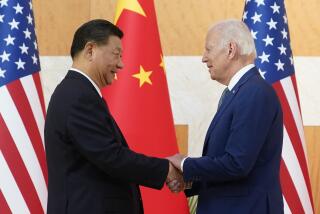China Casts a Giant Shadow : Beijing’s actions pull the spotlight away from weighty policy issues of women’s conference
- Share via
By the time First Lady Hillary Rodham Clinton arrives in Beijing next week, thousands of women from around the world already will have assembled there and begun to debate issues of their cause. The Non-Governmental Organizations Forum on Women ‘95, which begins today, is being held in conjunction with the U.N.-sponsored Fourth World Conference on Women, which opens Sept. 4. Both groups are seeking ways to improve the lives of women and girls by ensuring equal access to education, health care, jobs and other opportunities.
The conference has come to spotlight China as much as women’s issues. So far that view has not been flattering, and Beijing has only itself to blame. First, Chinese authorities, worried that the NGOs would have an undesirable influence and draw unwanted attention if they met in Beijing, relocated their conference to Huairou, only 30 miles north of Beijing but an hour’s drive away. Meanwhile, getting visas to enter China has been a problem for a number of delegates. Some have been flatly barred, notably delegates from Taiwan and Tibet. Reports from China say 10,000 women were turned back.
Complicating matters, Beijing had arrested American activist Harry Wu, troubling Sino-U.S. relations and sparking a debate on whether Mrs. Clinton, honorary chairwoman of the U.S. delegation, should attend the U.N. conference. Wu was subsequently sentenced and deported, clearing the way for her to attend. The White House announced last week that she would go.
Meanwhile, at the NGO conference out in the sticks, police have searched the luggage of participants outside their hotels and apartments, looking for forbidden political and religious materials. The authorities have set aside a restricted special area--a school sports field in Huairou--for the foreigners to hold demonstrations. The site is sealed off from the Chinese public, so any protests would take place in a vacuum.
The U.S. State Department is arguing that even if demonstrators are confined, they must be allowed to express themselves freely. The American position is that U.N. rules, which are far more permissive than China’s harsh laws, should prevail.
China’s tactics detract from the significant policy issues of the conference. The NGO and U.N. gatherings will address a range of matters affecting women and girls, including violence, poverty, human rights, access to education and health care, reproductive rights, infanticide and discrimination. As the conference begins, China should let the focus fall on the substance of the agenda, not the site of the conference and other peripheral matters.
More to Read
Sign up for Essential California
The most important California stories and recommendations in your inbox every morning.
You may occasionally receive promotional content from the Los Angeles Times.













